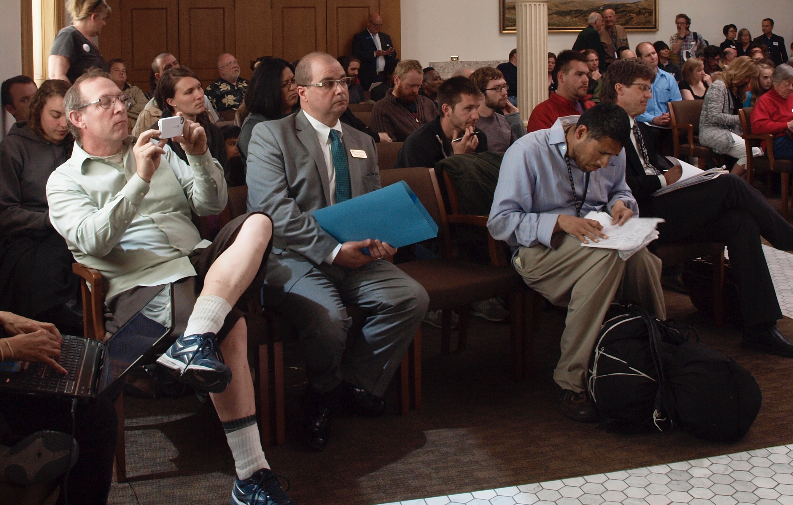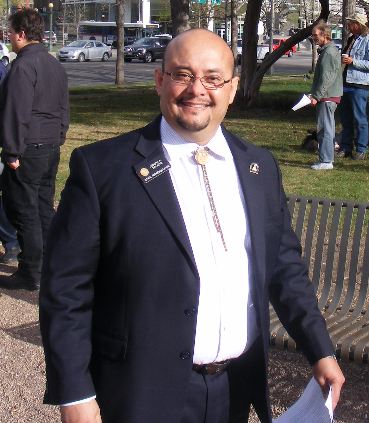Homes Not Handcuffs: Colorado’s Right to Rest Act
By Sarah Harvey
The Right to Rest Act could reverse the decades-long trend toward the criminalization of homelessness in Colorado.
Denver Homeless Out Loud (DHOL), a group that advocates for the rights of people experiencing homelessness across Colorado, will reintroduce the Right to Rest Act in the state legislature this year—maybe even as early as next month.
 Getty Images.If passed, the Right to Rest Act would overturn laws that are disproportionately applied to the homeless, such as sit-lie ordinances and bans on urban “camping.” It would allow people experiencing homelessness the right to move freely, rest, sleep, and protect themselves from the elements in public spaces. The bill would also give people the right to occupy a legally parked vehicle and the right to “eat, share, accept, or give food in any public space in which having food is not prohibited.”
Getty Images.If passed, the Right to Rest Act would overturn laws that are disproportionately applied to the homeless, such as sit-lie ordinances and bans on urban “camping.” It would allow people experiencing homelessness the right to move freely, rest, sleep, and protect themselves from the elements in public spaces. The bill would also give people the right to occupy a legally parked vehicle and the right to “eat, share, accept, or give food in any public space in which having food is not prohibited.”
DHOL’s goal is to “end the criminalization of existing in public space,” according to the group’s website. DHOL likens laws that criminalize homelessness to Anti-Okie, Sundown, Jim Crow, and other laws intended to remove people seen as “undesirable” from public spaces.
 Denver Homeless Out Loud will reintroduce the Right to Rest Act this month. Photo Courtesy of DHOL.Not everyone agrees. City governments across Colorado opposed the last Right to Rest Act. In an interview last year with the Daily Camera, Boulder’s city attorney’s office cited concern over losing control of its parks and other public spaces. The Colorado Municipal League (CML) also opposed the first bill, primarily due to financial restitution language that would have allowed a person to sue a municipality up to $1,000 over perceived harassment.
Denver Homeless Out Loud will reintroduce the Right to Rest Act this month. Photo Courtesy of DHOL.Not everyone agrees. City governments across Colorado opposed the last Right to Rest Act. In an interview last year with the Daily Camera, Boulder’s city attorney’s office cited concern over losing control of its parks and other public spaces. The Colorado Municipal League (CML) also opposed the first bill, primarily due to financial restitution language that would have allowed a person to sue a municipality up to $1,000 over perceived harassment.
Many opponents of the previous bill argued that there were already services to help the homeless, and that camping bans and sit-lie ordinances are necessary to nudge people toward those services.
“That was a big piece of the rhetoric that was used to say we don’t actually need basic human rights to sit and sleep,” said Terese Howard, organizer with DHOL and one of its founding members. “Moving them along to services that, number one, don’t exist,” she continued. “We don’t have a number of shelter beds that corresponds to the number of homeless people, [not] by a long shot.” A second consideration, Howard points out, is that not everyone experiencing homelessness feels comfortable going to existing shelters.
Denver’s camping ban prohibits unauthorized “camping” on public or private property. The ordinance defines camping as follows: “’Camp’ means to reside or dwell temporarily in a place, with shelter, and conduct activities of daily living such as eating, sleeping, or the storage of personal possessions in such a place. The term ‘shelter’ includes, without limitation, any tent, tarpaulin, lean-to, sleeping bag, bedroll, blankets, or any form of cover or protection from the elements other than clothing.”
In other words, people who can’t find a shelter bed and people who don’t feel safe in a shelter bed violate Denver’s camping ban if they attempt to protect themselves from the elements while sleeping outside.
“You literally cannot lay down and cover yourself with a blanket,” said Howard. “That is crazy. That is absolutely crazy.”
A Statewide Issue
After Denver enacted a citywide camping ban in 2012, DHOL began surveying people experiencing homelessness in the city to find out how the ban was affecting them. The group soon realized it had a much larger battle to fight.
“We started to look at the bigger picture,” said Howard. “It’s not just the camping ban that’s a problem. There are all these other laws, and it’s not just Denver, it’s all across the state.”
DHOL connected with people sponsoring a similar Right to Rest act in California. By September 2014, the group had drafted Colorado’s first Right to Rest Act. The bill was sponsored by Rep. Joe Salazar (D-Thornton), Rep. Jovan Melton (D-Aurora), and Sen. John Kefalas (D-Fort Collins). Early last year, DHOL joined the Western Regional Advocacy Project (WRAP). WRAP is part of a broader Homeless Bill of Rights campaign aimed at passing Right to Rest acts in Colorado, California, and Oregon.
In April 2015, the House Committee on State, Veterans, and Military Affairs voted 8-3 to postpone the Right to Rest Act indefinitely, effectively killing the bill in committee. But that didn’t stop DHOL. The group immediately began working to refine and reintroduce the bill in 2016.
Preparing for Another Battle
Since last April, DHOL has been surveying people experiencing homelessness across the state with the help of partner organizations such as the Fort Collins Homeless Coalition and PATH in Colorado Springs.
DHOL has also partnered with the Homeless Advocacy Policy Project of the University of Denver Sturm College of Law. The group of students, led by law professor Nantiya Ruan, researched laws that target homeless individuals in 76 cities in Colorado. They also examined how those laws are being enforced in 26 of those cities, and calculated how much it costs cities to enforce these laws. The group expects to publish the report this month. “The report will show that Colorado cities are misusing valuable resources by citing, arresting, and jailing homeless individuals,” said Ruan.
Once again, the Right to Rest Act has support from Reps. Joe Salazar and Jovan Melton and Sen. Kefalas, as well as several co-sponsors who have pledged to support the bill.
“I think that we’re on the right side of history with this bill,” said Salazar. “It just seems that it’s taking my colleagues a little while longer to catch up with the rest of the world.”
Though it is not vastly different, some changes have been made to the bill, noted Howard. For example, financial restitution language likely will not be included in the new bill. Though the groups who spoke against the bill last year are hesitant to comment on the new bill without having read it, the Right to Rest Act will likely face many of the same opponents. If the legislation is the same as last year, CML will oppose the bill again, said Meghan Dollar, Legislative and Policy Advocate for CML.
The Future of Right to Rest
Though the bill itself might not have changed much, there is reason to believe the general public—and the lawmakers who represent them—may be more sympathetic this time around.
Just four months after the first Right to Rest Act was defeated, the Department of Justice filed a statement of interest in a Boise, Idaho case arguing that camping bans are unconstitutional. The crux of the DOJ’s argument was that, when a person literally has no other place to sleep, issuing that person a citation for sleeping outside is cruel and unusual punishment.
In September 2015, the Department of Housing and Urban Development (HUD) changed the application process for federal Continuum of Care grants. Service agencies and organizations now have to describe how they are working to reduce the criminalization of homelessness in their area to qualify for funding. Cities with laws criminalizing panhandling and urban camping could miss out on the almost $2 billion that HUD gives out nationally in Continuum of Care grants each year.
 Rep. Joe Salazar will sponsor the Right to Rest Act again. Photo Courtesy of DHOL.“Those statements have instigated thought and potential change,” said Howard. And Lyall thinks this bodes well for the reintroduction of the Right to Rest Act. “When the Department of Justice made that statement, I was ecstatic,” he said.
Rep. Joe Salazar will sponsor the Right to Rest Act again. Photo Courtesy of DHOL.“Those statements have instigated thought and potential change,” said Howard. And Lyall thinks this bodes well for the reintroduction of the Right to Rest Act. “When the Department of Justice made that statement, I was ecstatic,” he said.
Salazar echoed the sentiments of the DHOL representatives. “I think that the ordinances that we’re seeing across the state are unconstitutional, and I think that the Department of Justice’s opinion bears that out,” he said.
Another thing that’s different this time around is that the Right to Rest Act is not new.
“The fact that it’s back again and we’re not stopping,” said Howard, “I think is a big deal.”
DHOL wants the state to recognize that criminalizing homelessness is a drain on city resources. It’s also reinforcing a cycle of poverty; by slapping someone with a criminal record, it makes it that much harder for that person to find employment, credit, and housing. It makes it impossible for them to rest.
“This is a long haul struggle,” said Howard, who recognizes that one bill isn’t going to change everything. “There’s still going to be legal battles.”
But DHOL won’t rest until everyone in Colorado has the right to do so. ■
